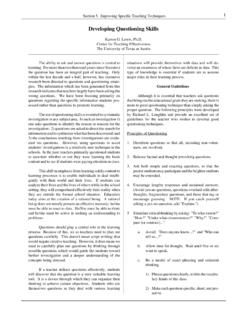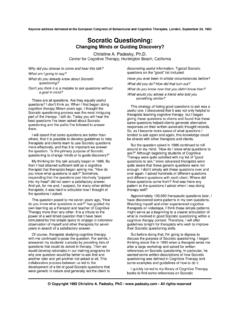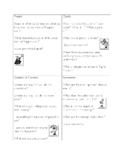Transcription of Questioning Evangelism - Newman, Randy
1 WHY ASK QUESTIONS? CHAPTER 1 Why Are Questions Better Than Answers? I LL NEVER FORGET HIS It was one that I d never heard before He was from Ukraine and was possibly the mostsincere seeker I ve ever met. I just didn t know what to do withhim. We struck up a conversation on the center lawn of theAmerican University in Washington, , on a spring-like day inNovember. It wasn t supposed to be that warm. But there we were,Artyum and I, basking in the sunshine, when the calendar said thatwe should have been inside sipping cups of hot talk ed ab o u t th e w eath er, clas s es , h o m eto w n s , an d th in g slike that. Then he asked me what I did on campus. When workingfor an organization with the name Campus Crusade for Christ andpeople ask, What do you do? it doesn t take long to steer theconversation toward the gospel.
2 It s one of the perks of being a trained evangelist, I steered our chat to the point where alittle green booklet became the focal point of our conversation. Knowing God Personally is an adaptation of The Four SpiritualLaws, and is a good evangelistic tool for sharing the Istill believe that as much as ever. But what happened that day at theAmerican University changed my thinking about some of the wayswe do d been trained and had conducted seminars in how tointroduce the booklet, how to progress through the booklet, how toavoid distractions during the booklet, how to bring someone to thepoint of decision at the end of the booklet, and how to walk him orher through that eternity-changing moment of conversion afterconcluding the booklet. I could state the advantages of using sucha tool (and there are many).
3 I could show the drawbacks of justwinging it and not using such a focused tool (and there are many).And I could share stories of how God has used it to lead manypeople to the read the first point, God loves you and created you to knowHim personally. I don t remember pausing at that point. I don tthink I even breathed. But somehow Artyum interrupted. What do you mean when you say the word God? hewondered aloud. And what do you mean when you say the wordlove? And, most importantly, how do you know all this is true? It was a difficult moment for me. All of my training had toldme to sweep away any and all questions with That s a goodquestion. How about we come back to that when I m done readingthe booklet? That line had worked well many times for me. Theinevitable result was that the questions would be forgotten andnever brought up again.
4 That s because many, maybe most,questions that are asked early during an evangelistic presentationare not real questions they re smokescreens. The questioner istrying to avoid the conviction that is sure to come when oneconfronts the they stop the presentation before it gets uncomfortablewith, Well, we can t really believe the Bible; it s got too manycontradictions in it, or There are so many religions in the world,how can anyone know which one s right? or a million otherpretentious comments that should be swept away with the That s-a-good-question Artyum s questions were different. They weren tsmokescreens. I know the difference between an honest inquirerand a truth-avoider. Artyum s questions were foundational. CouldI progress to the second page in the booklet and read, People aresinful and separated from God if he was stuck on the words Godand love?
5 What would be in store for us when we hit the wordsin?I mentally reviewed the background data that I d gatheredearlier in our chat and connected it to our present discussion. Beingfrom Ukraine, Artyum had been reared in an atheistic, communistworld, reading Nietzsche and Marx and thinking deeply about was a history major who loved philosophy and was botheredby the intellectual shallowness displayed by most Americans. Hewasn t annoyed by my initiation of Evangelism . He genuinelywanted to work through his questions. Unlike me, however, hedidn t feel any pressing need to work through the booklet. He didfeel, however, a sense of importance about working through realinteraction about weighty followed was a ninety-minute discussion, revolvingaround questions that strike at the foundation of faith: How do weknow what we know?
6 What do we know for certain? and What difference does it all make? Toward the end of theconversation, I was asking more questions of him than he did helped me rethink the task of Evangelism is the result of that process. And in allof the examples in this book, Artyum s is the only name that Ihaven t disguised. Although I refer to real people in realconversations, all other names have been changed. But I ve keptArtyum s name, hoping that someday he ll see this book andcontact me, telling me that he s come to faith in Christ. He didn tthat day on American University s lawn. I lost track of him soonafter the weather returned to normal November Are We Frustrated? I came away from that conversation both excited andfrustrated.
7 Communicating at that level of intensity and truth-seeking was invigorating. That level of excitement was relativelynew, but the frustration was all too familiar. Another don t as readily pray the prayer with me as they do withfamous speakers I ve heard. Those natural evangelists are alwayssitting down next to someone and sharing the gospel. And theyalways lead every person to a salvation decision. (And it s alwayson an airplane!)Some people have told me that my lack of evangelistic fruitresults from lack of prayer. I certainly don t pray enough, but Iwonder if that s all there is to it. Other people have told me that Idon t push hard enough in closing the sale. I don t know how torespond to that; the gospel isn t a product that we sell. Onintrospection, I ve wondered what I haven t said to work the samemagic as so many ve found that I m not alone in my frustration.
8 In fact,frustration might be the most common emotion that Christiansassociate with Evangelism (followed closely by guilt, confusion,and despair). Our frustration is multifaceted. We re frustrated thatour message doesn t yield more decisions, genuine fruit, culturalimpact, or advancing of God s kingdom in the way about whichJesus , we just don t have as many evangelistic conversations aswe know we should. The message that has gripped our hearts andforms the centerpiece of our lives remains unspoken, unshared,and unproclaimed. We miss opportunities to tell people what Jesusmeans to us. Our culture s secularism has silenced us when weshould be sharing. We wonder why the topic that is so often onour minds is so seldom on our , most of us don t hold a candle to people who aregifted by God as evangelists.
9 And when we actually do step out infaith and share Christ, not as many people as we d like bow theirheads and pray the sinner s prayer. So hearing about thesuccesses of a Billy Graham only adds to our frustration. Instead ofmotivating us to be bold, the success stories discourage us. That snot an excuse, though. Paul told Timothy, who was a timid non-evangelist, to do the work of an evangelist (2 Tim. 4:5). So wefind ourselves clinging to the promise that God forgives even thegreatest of sinners assuming that sinners means those who areevangelistic failures and hoping for a method of Evangelism , we re frustrated by the lack of lasting fruit. If you veever led someone to Christ, and then later found that person totallyuninterested in spiritual growth, you know the pain to which I mreferring.
10 True, not all the seeds in Jesus parable landed on goodsoil. Still, we wonder why some plants spring up and then witherin the sun, or on the rocky soil, or under the distractions of thisworld. We wonder why, for all of our evangelistic efforts, thepercentage of born-again Christians in our country has remainedstagnant for more than thirty years. Yet the percentage ofMormons, Muslims, and purchasers of New Age crystals , we re frustrated by our lack of saltiness, that is,cultural impact. If we re supposed to be the salt of the earth, apreservative, why is our culture decaying?These frustrations are realized in an environment of suchreligious diversity that many of us question some of our basicassumptions about Christian belief.




